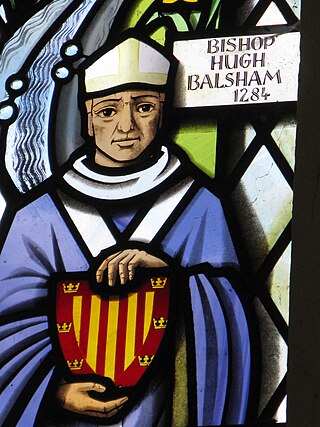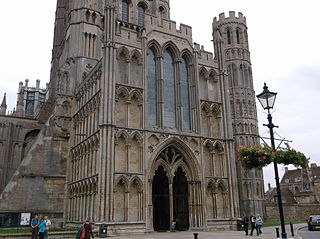Related Research Articles

Hugh de Balsham was a medieval English bishop.
Robert Winchelsey was an English Catholic theologian and Archbishop of Canterbury. He studied at the universities of Paris and Oxford, and later taught at both. Influenced by Thomas Aquinas, he was a scholastic theologian.
John de Gray or de Grey was an English prelate who served as Bishop of Norwich, and was elected but unconfirmed Archbishop of Canterbury. He was employed in the service of Prince John even before John became king, for which he was rewarded with a number of ecclesiastical offices, culminating in his pro forma election to Norwich in 1200. De Gray continued in royal service after his elevation to the episcopate, lending the King money and undertaking diplomatic missions on his behalf. In 1205 King John attempted to further reward de Gray with a translation to the archbishopric of Canterbury, but a disputed election process led to de Gray's selection being quashed by Pope Innocent III in 1206.
Ralph d'Escures was a medieval abbot of Séez, bishop of Rochester, and then archbishop of Canterbury. He studied at the school at the Abbey of Bec. In 1079 he entered the abbey of St Martin at Séez and became abbot there in 1091. He was a friend of both Archbishop Anselm of Canterbury and Bishop Gundulf of Rochester, whose see, or bishopric, he took over on Gundulf's death.

Eustace was the twenty-third Lord Chancellor of England, from 1197 to 1198. He was also Dean of Salisbury and Bishop of Ely.
John de Halton, also called John de Halghton, was an English priest and Bishop of Carlisle from 1292 to 1324.
Philip of Poitou was Bishop of Durham from 1197 to 1208, and prior to this Archdeacon of Canterbury.

Roger de Pont L'Évêque was Archbishop of York from 1154 to 1181. Born in Normandy, he preceded Thomas Becket as Archdeacon of Canterbury, and together with Becket served Theobald of Bec while Theobald was Archbishop of Canterbury. While in Theobald's service, Roger was alleged to have committed a crime which Becket helped to cover up. Roger succeeded William FitzHerbert as archbishop in 1154, and while at York rebuilt York Minster, which had been damaged by fire.

Reginald Fitz Jocelin was a medieval Bishop of Bath and an Archbishop of Canterbury-elect in England. A member of an Anglo-Norman noble family, he was the son of a bishop, and was educated in Italy. He was a household clerk for Thomas Becket, but by 1167 he was serving King Henry II of England. He was also a favourite of King Louis VII of France, who had him appointed abbot of the Abbey of Corbeil. After Reginald angered Becket while attempting to help negotiate a settlement between Becket and the king, Becket called him "that offspring of fornication, that enemy to the peace of the Church, that traitor." When he was elected as a bishop, the election was challenged by King Henry's eldest son, Henry the Young King, and Reginald was forced to go to Rome to be confirmed by Pope Alexander III. He attended the Third Lateran Council in 1179, and spent much of his time administering his diocese. He was elected Archbishop of Canterbury in 1191, but died before he could be installed.
John of Sittingbourne was Archbishop of Canterbury-elect in 1232.
Savaric fitzGeldewin was an Englishman who became Bishop of Bath and Glastonbury in England. Related to his predecessor as well as to Emperor Henry VI, he was elected bishop on the insistence of his predecessor, who urged his election on the cathedral chapter of Bath. While bishop, Savaric spent many years attempting to annexe Glastonbury Abbey as part of his bishopric. Savaric also worked to secure the release of King Richard I of England from captivity, when the king was held by Emperor Henry VI.
William of St. Barbara or William of Ste Barbe was a medieval Bishop of Durham.
Robert Stitchill was a medieval Bishop of Durham in England.
William Chillenden, also known as Adam of Chillenden, was a monk at Christ Church Priory, Canterbury, and treasurer of that priory when he was elected Prior of Christ Church in 1263.
Simon Langton was an English medieval clergyman who served as Archdeacon of Canterbury from 1227 until his death in 1248. He had previously been Archbishop-elect of York, but the election was quashed by Pope Innocent III.
William Langton was a medieval English priest and nephew of Archbishop Walter de Gray. William was selected but never consecrated as Archbishop of York and Bishop of Carlisle.
Walter Mauclerk was a medieval Bishop of Carlisle and Lord High Treasurer of England.
Ralph Walpole was a medieval Bishop of Norwich and Bishop of Ely.
John Salmon was a medieval Bishop of Norwich.

Richard Marsh, also called Richard de Marisco, served as Lord Chancellor of England and Bishop of Durham.
References
- Fryde, E. B.; Greenway, D. E.; Porter, S.; Roy, I. (1996). Handbook of British Chronology (Third revised ed.). Cambridge: Cambridge University Press. ISBN 0-521-56350-X.
- Greenway, Diana E. (1971). Fasti Ecclesiae Anglicanae 1066–1300: Volume 2: Monastic Cathedrals (Northern and Southern Provinces): Canterbury: Archbishops. Institute of Historical Research. Retrieved 11 September 2007.
- Powell, J. Enoch; Wallis, Keith (1968). The House of Lords in the Middle Ages: A History of the English House of Lords to 1540 . London: Weidenfeld and Nicolson. OCLC 463626.